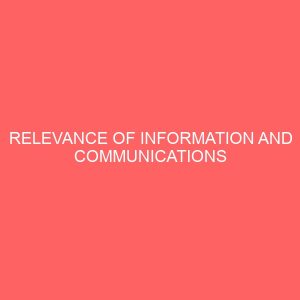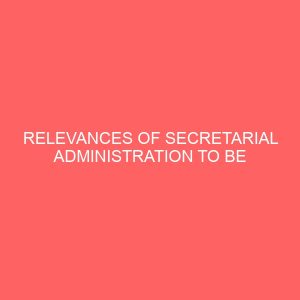Description
CHAPTER ONE
1.0 Introduction
This research is on Relevance of information and communications technology towards the upliftment of an organization. The world of business is changing rapidly as a result of technological development. This is very wide departure from the traditional business enterprises to the evolution of international and multinational organizations in Nigeria economy. Some of these establishments have acquired and installed modern communications equipment.
Thus, information technology and an ultimate fully electronic office is fast becoming a reality. In effect, information and communication technology pose a lot challenges to office employees. The impact of technological improvement in the office demands that the development of a successful secretarial career today depends of upon the secretary to acquire information and communication technology (ICT) based skills and expertise as well skills required for each category of staff.
Technology changes in our environment coupled with competition within a particular industry or in the society account for the reason why secretaries should engage in training and development to meet up with the challenges. This is as a result of the need to match changes in structure, policies, technology, processes and producers with the needed performance, attitude and behaviors. This study will provide a sight into the present day technological realities in and office and how a secretary could fit into it.
1.1 Statement of the Problem
Inspite of the local government development in Information and Communication Technology (ICT) the third world countries , including Nigeria, are yet to harness the technology to its fullest capacity in view of this research work will focus on to case study in Ibadan North Local Government and industry both tub lie? What role does it entail to require on information unit. Also the source processing to information in local government finally what effect does it have in management decision making.
1.2 Objectives of the Study
The case study of Ibadan North East Local Government is for the following objectives.
- To find out how relevant Information and Communication, Technology is to Ibadan North Local Government.
- To find out about the value, qualities and properties of ICT towards the achievement of Ibadan North East Local Government.
- Also we intend to look on Information Communication Technology (ICT) will help of Local Government to achieve their corporate objective.
1.3 Research Question Hypothesis
- What is information unit processing Case study of Ibadan North East Local Government?
- Identify properties of information in unit.
- What are the benefits derived from effecting and efficient management information unit?
- Com ICT improvement the profitability of Local Government?
- What are the sources of information unit?
1.4 Significance of the Study
The successfully completion of this project will enable for the Local Government and the corporate word to have the predictor of ICT i.e. Information Communication Technology in Ibadan North East Local Government performance its use fullness to local government world will be tremendous and a use fullness toll for corporate decision marker increase of strategic planning and ICT application.
1.5 Scope of the Study
The study shall examine what relevant information and communication technology has in store its local government for chairman especially local government parishioners and other areas of ICT application. This study has be constructed by time resources and problem of current date.
1.6 Limitation of the Study
During the processing of the research, the researchers faced some limitation such as: local government which constitute the population sample did not take questionnaire seriously like the local government to support in terms of the historical background done to the occupy only in their business not when the importance was spell out lence more time than scheduled was used on its local government.
1.7 Operational Definitions of Terms
Information communication technology is technology that supports involving the creation storage, manipulation and communication of information, together with the recated methods, management and application properties of information this refers to the determinate usefulness of information like information presentation.
1.8 Historical Background of the Cash Study of Ibadan North East Local Government
Overview of past administration
At the inception of the local government in 1991 a civil servant now a retired permanent secretary Alhaji Bashiru Adesola Akinola was appointed as the first sole administrator to administer the local government he was in the saddle until the local government election was held under the two-party system that featured the Social Democratic Party (SDP) and the National Republican Convention (NRC). The election saw that emergence of Chief Jacob Akinyemi as the culture and tourism.
The local government is inhabited predominantly by the Yoruba?s who cohabit peacefully with other ethnic groups. This is evident in the substantial number of people from other parts of the country who reside and trade in the local government.
Tourist attractions include a good number of decent hotels recreation center and traditional markets the Akeu water spring project situated at Oke Offa, Babasale is another tourist centre supported by the Ibadan sustainable project (ISP) and UNICEF. The broadcasting corporation of Oyo state
(BCOS) also located at Bashorun to is within the territory of the local government area.
The executive council includes:
1. Chairman
2. Vice chairman
3. Secretary to the local government
4. Supervisors
The legislative council includes
1. Leader
2. Deputy leader
3. Chief whip
4. Minority leader
5. Other councilors
Preface
Jacob Akinyemi as the essentially this book provides information about the local government to assist research students, pressman and the general public who are interested in having informed knowledge about the local government historical background geography, social culture and economic potentials.
It also incorporated the indelible foot prints of the forward looking administration ably led by Hon. Olugbenga Ayinde Aewusi that has brought monumental transformation to the local government. It however, should be noted that it was not possible to capture all the major landmarks of the admistration in view of the tempo and with ease development projects were executed day by day what we have attempted to capture, for record purposes, represent the reality at the time we want to press when the administration was thirty months old.
Meanwhile credits have to be given to Elder K. O Oyerinde, the director of personnel management for painstakingly smoothen the rough edges of this book in manuscripts and the invaluable contributions of the other staff of the information unit.
We own much gratitude to the measurement to have graciously approved this publication which we hope will be of immense value to the people of the government and the general public.
Femi Ogundipe
Head of Information Unit
General information
Primary schools within the Ibadan north east local Government
1. H.L.A Primary School 1 Agodi, Ibadan
2. H.L.A Primary School II Agodi, Ibadan
3. H.L.A Primary School for the handicapped
4. I.M.G Primary School Agodi, Ibadan
5. I.M.G Primary School I Agodi, Ibadan
6. Methodist Primary School Agodi, Ibadan
7. Methodist Primary School I Agodi, Ibadan
8. S.D.A Primary School I Agodi, Ibadan
9. S.D.A Primary School II Agodi Ibadan
Agugu Zone
10. Christ the King Primary School Agodi, Ibadan
11. I.M.G Primary School I Agodi, Ibadan
12. Community School Akinyele, Ibadan
13. I.M.G Primary School I Agugu, Ibadan
14. I.M.G Primary School I Agugu, Ibadan
15. I.M.G Primary School II Agugu, Ibadan
16. Islamic Primary School I Agugu, Ibadan
17. Islamic Primary School II Agugu, Ibadan
18. Mufutau Lanihun Primary School Ibadan.
Aremo Zone
19. Lanon Okusehinde Memorial School I Aremo, Ibadan
20. Lanon Okusehinde Memorial School II Aremo, Ibadan
21. C&S Primary School I Ode-Aje Ibadan
22. F.O.A Primary School I Ode-Aje Ibadan
23. F.O.A Primary School II Ode-Aje Ibadan
24. H.L.A Primary School I Aremo, Ibadan
The Administrative Of Hon.Olugbenga Ayinde Adewusi Profile
Hon. Gbenga Ayinde Adewusi was born in Ibadan on 7th May 1962. He began his education career as a pupil in St. Paul?s Anglican Primary School Yemetu Ibadan between 1971 and 1976. He attended the community modern school, Erunmu between 1977 and 1980 Adekile Goodwill Grammar School Ibadan between 1981 and 1982 and Ansar-Un-Deen Teachers College Ota between 1983 and 1986; it was at the early stage of his education that his interest in sports developed. Hence, he proceeded to the University of Lagos where he obtained a diploma in physical and health education in 1992.
A hardworking and very energetic young man, Hon Olugbenga Adewusi worked in the following places from 1982 to 2003 they are:
Obasanjo Farms Nigeria Ltd (1982-1983).
Farmgate Hotel Complex (1988-1996).
The Bells comprehensive Secondary School (1996-1999).
The presidency (1992-2003)
Prior to his election as the executive chairman he serve as the chairman of the interim management committee of the local government which was put in place after the expiration of the tenure of the defunct administration his outstanding performance during the interim appointed was unprecedented in the history of the administration of the local government for well over forty projects were executed within the short period of the interim administration.







